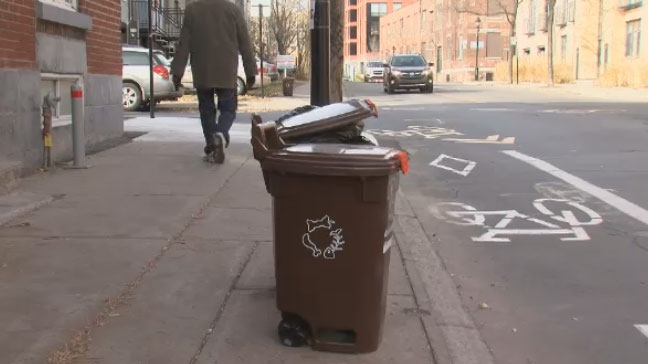Montreal looks to boost lagging participation in food waste collection
 Compost bins line the streets of the Southwest borough.
Compost bins line the streets of the Southwest borough.
Brown bins have become ubiquitous on Montreal streets and doorsteps, but nearly half are not being used, data suggests.
The city says a large-scale food waste awareness campaign will launch later this year to try to change that.
All residential buildings with under nine units now have brown bins—but only 63 per cent actually sort their waste, according to a 2021 survey conducted by the city.
In buildings with nine or more units, 58 per cent participate, though the rollout for that group is ongoing.
The city hopes to be the first major Canadian city to offer brown bins for everyone by 2025.
On top of that target, there is another deadline approaching.
The Lachenaie landfill in Terrebonne—the only landfill in the Montreal area—is set to reach its capacity in 2029.
"Where are we going to put an expansion to an existing landfill or a brand new landfill? It's very difficult," says Grant Clark, an associate professor in McGill University's department of bioresource engineering.
Diverting waste from landfills is also key for fighting climate change, says Clark.
In the composting process, food waste breaks down into material used to grow more food, fibre for textiles and potentially biofuels.
"We can regenerate those resources indefinitely. And that's the key to a sustainable society," he says.
When that waste is buried in landfills, it produces methane, a potent greenhouse gas about 25 to 30 times more potent than carbon dioxide, says Clark.
"So if that's released into the atmosphere, it's a big contributor to climate change."
CHANGING HABITS
The mayor of Montreal's Mercier–Hochelaga-Maisonneuve borough says this summer has been a wake-up call about climate change.
"We're facing a real crisis," says Pierre Lessard-Blais, referring to an unprecedented forest fire season paired with poor air quality concerns.
The borough is in the midst of moving to a bi-weekly trash collection schedule in a bid to reduce emissions and divert food waste from landfills.
"We know that only 15 per cent of garbage is actually garbage. The rest can either be composted, recycled or reused in any other way," said Lessard-Blais.
The change follows a pilot project last year, which he says saw participation in food waste collection rise by 20 per cent.
It's a strategy already used in Drummondville, Longueuil, Toronto and Calgary, says Lessard-Blais.
There is also a follow-up process in the borough, meaning residents will know if they fill their brown bins improperly.
"We have inspectors that walk on the street to open the bins and can simply knock on doors and sensibilize people on how to make better choices," he said.
RACE TO ZERO-WASTE
Composting is a pillar of the city's plan to become a zero-waste city by 2030, a target we should take with a grain of salt, says Clark.
"We will never quite get there," says Clark. "There will always be people who won't engage in or participate in that activity. And any collection process or processing facility is going to be imperfect."
That said, Clark says the city is moving in the right direction and believes educating the next generation is crucial to moving closer to its target.
"We have to teach kids from a very young age why this is important and how they should do it. Adults, often, we're set in our ways. It's difficult for us to change. We need a public education program to help everybody to understand."
The city says brown bins are currently being rolled out to all primary and secondary schools in the city.
CTVNews.ca Top Stories

Ministers Joly, LeBlanc travel to Florida to meet with Trump's team
Two members of Prime Minister Justin Trudeau's cabinet will be in Palm Beach, Fla., Friday to meet with members of Donald Trump's team.
India alleges widespread trafficking of international students through Canada to U.S.
Indian law enforcement agencies say they are investigating alleged links between dozens of colleges in Canada and two 'entities' in Mumbai accused of illegally ferrying students across the Canada-United States border.
Teen actor Hudson Meek, who appeared in 'Baby Driver,' dies after falling from moving vehicle
Hudson Meek, the 16-year-old actor who appeared in 'Baby Driver,' died last week after falling from a moving vehicle in Vestavia Hills, Alabama, according to CNN affiliate WVTM.
Pizza deliverer in Florida charged with stabbing pregnant woman at motel after tip dispute
A pizza deliverer in central Florida has been charged with pushing her way into a motel room with an accomplice and stabbing a pregnant woman after a dispute over a tip, authorities said.
Christmas Eve stowaway caught on Delta airplane at Seattle airport
A stowaway was caught trying to nab a ride on a Delta Air Lines plane at Seattle-Tacoma International Airport on Christmas Eve.
2 minors, 2 adults critically injured in south Calgary crash; incident was preceded by a robbery
Multiple people were rushed to hospital, including two minors, in the aftermath of a serious vehicle collision on Thursday morning.
Hwy. 401 off-ramp shut down due to Boxing Day deal-hunters now re-open
A Highway 401 off-ramp west of Toronto that became so clogged up with Boxing Day deal-hunters Thursday that police had to shut it down out of safety concerns has re-opened.
Cat food that caused bird-flu death of Oregon pet was distributed in B.C.: officials
Pet food contaminated with bird flu – which killed a house cat in Oregon – was distributed and sold in British Columbia, according to officials south of the border.
Aviation experts say Russia's air defence fire likely caused Azerbaijan plane crash as nation mourns
Aviation experts said Thursday that Russian air defence fire was likely responsible for the Azerbaijani plane crash the day before that killed 38 people and left all 29 survivors injured.
































